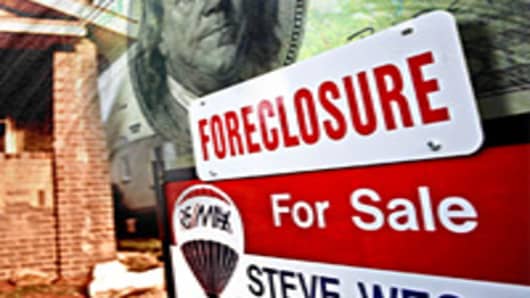A mortgage bailout plan hatched between Wall Street and Congress is gaining political traction even though it could be on a crash-course with the Bush administration.
The plan would amount to a steroid boost for the Federal Housing Administration, a program conceived to help poor people buy homes that is now being used as a subprime mortgage
lifeline.
Both Credit Suisse and Bank of America have mapped out how the FHA could gather up more shaky home loans and Rep. Barney Frank, chairman of the House Financial Services Committee, on Thursday offered legislation to do just that.
Under those plans, the government would take failing mortgages off the hands of investors and write new terms that would prevent foreclosure.
The Frank bill is specifically aimed at borrowers who are distressed because the value of their home has dropped.
His legislation would see lenders write down the mortgage amount in exchange for a government guarantee the new loan would not fail. Lenders who have a choice between seizing a home or taking a hit on the loan amount could find the plan appealing.
The Frank plan was endorsed Thursday by another key Democrat -- Senate Banking Committee Chairman Christopher Dodd-- but the Bush administration and congressional Republicans
have signaled that they would not countenance a costly, investor bailout.
"I'm not surprised that the industry would support a government-backed solution but we are going to be watching the potential risk to the taxpayer," said a senior Republican Senate aide, who asked not to be named.
An aide to Frank said the lawmaker expects to need no more than $20 billion in capital costs for the program.
The Bush administration has already widened the scope of the FHA once, announcing in August that some delinquent borrowers would be permitted to refinance mortgages through the
program.
Since then, officials have repeatedly said they do not want to do anything that would bailout lenders and speculators, and they have been decidedly cool to putting taxpayer money at
risk.
Still, President Bush left the door open to tapping government funds in remarks Wednesday. "I just need to hear what the good plan is, and without having lasting long-term damage to the economy," he told public broadcasting's Nightly Business Report.
Advocates of swift government help for the rattled housing market see FHA expansion as the quickest and least-complicated plan.
"FHA has traditionally been about making homes affordable but it can also help stabilize rattled markets. That's the role it can play here," said Howard Glaser, who worked for the Department of Housing and Urban Development in the Clinton administration.
FHA was created during the Great Depression to help high-risk or low-income borrowers win better loan terms by insuring mortgage payments. A federal clearinghouse for FHA mortgages, known as Ginnie Mae, sells bundles of home loans to investors with a federal guarantee.
Wall Street firms have pitched their ideas for expanding FHA at meetings with the Treasury Department and HUD. And while the federal program is typically aimed at helping low-income
borrowers it has been used in the past to bring targeted relief to mortgage markets in distress, said Glaser.
"When the Oil Patch states went into a recession in the 1980s, FHA was an important tool to help people keep their homes," he said.


